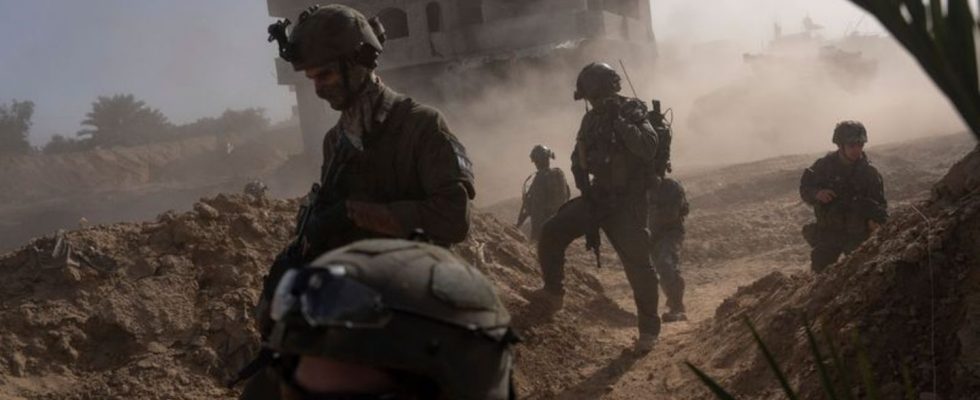War in the Middle East
UN court decides on military operation in Gaza
Israeli soldiers take position during a ground operation. photo
© Ohad Zwigenberg/AP
Fierce fighting continues in the southern Gaza Strip. Baerbock calls for compliance with international humanitarian law. And Israel faces defeat at the highest UN court. The overview.
In the midst of the heavy fighting The Gaza Strip is today making its first preliminary decision in the explosive genocide case against Israel at the International Court of Justice in The Hague.
This is not yet about the main accusation of genocide, but rather an urgent application for protective measures for the Palestinians. This calls on the UN judges to order Israel to immediately stop military actions in the Gaza Strip.
Decisions of the Court are binding. Even if he has no power to enforce this, a reprimand from the highest UN court would still be a defeat for Israel. International pressure would probably continue to increase. The judges can also order that Israel report on measures taken to protect Palestinians. That would also have a considerable external impact
Israel: Right to self-defense taken away
South Africa filed a lawsuit against Israel at the end of December, accusing the country of violating the Genocide Convention. It is the first time that Israel has had to face genocide charges before the UN court. At the hearing in the Peace Palace in The Hague about two weeks ago, Israel’s representative firmly rejected the allegations.
“Israel is at war with (the Islamist organization) Hamas, but not with the Palestinian people,” Israeli Foreign Ministry legal advisor Tal Becker said. Israel also rejected calls for an end to the military operation. The reason given was that this would deprive the country of its right to self-defense.
The reason for the Gaza war was a devastating massacre by Hamas and other extremists on October 7, 2023. Around 1,200 people were killed and around 250 were kidnapped from Israel. Israel blames Hamas for the casualties and suffering of civilians in the Gaza Strip.
Fierce fighting in the southern Gaza Strip
Meanwhile, 200 people were killed and 370 others injured in the coastal area in the last 24 hours alone, the Hamas-controlled Ministry of Health said on Thursday evening. This means that the number of deaths since the start of the war on October 7th has risen to 25,900 and the number of injured to more than 64,000. The numbers can hardly be verified independently.
The Israeli military and Palestinian health services reported further heavy fighting to the west of the city of Khan Yunis in the southern Gaza Strip. At the beginning of the week, the Israeli military launched an offensive in the western part of Khan Yunis, which it had not yet penetrated into. The largest city in the southern Gaza Strip is considered a Hamas stronghold.
Israeli units bombed and shelled the area surrounding Amal Hospital, the aid organization Palestinian Red Crescent said on Thursday. The clinic is completely surrounded. Rescue workers and those seeking help could no longer reach them. According to eyewitnesses, the Israeli military also made intensive advances in the area around Nasser Hospital. Thousands of people are on the run.
Baerbock appeals to Israel – talks in Jordan
In view of the humanitarian crisis in the Gaza Strip, Foreign Minister Annalena Baerbock urged Israel to comply with international humanitarian law when taking actions in Khan Yunis, for example.
On the sidelines of her East Africa trip, the Green Party politician said on Thursday evening in Nairobi, with a view to the heavy fighting in the city in the south of the Gaza Strip, that she was “extremely concerned” about the desperate situation of the people.
“There are also rules when it comes to the right to self-defense, and international humanitarian law also applies to the fight against terrorists,” said Baerbock. “Israel must comply with this just like all other states in the world – even in a difficult environment in which Hamas breaks all the rules and uses people as protective shields.”
The Foreign Minister wants to make a short trip to Jordan in connection with the mediation efforts in the Gaza war. Baerbock will “continue to travel to Jordan following her East Africa trip and hold political discussions on the Middle East crisis there on Saturday,” sources in the Foreign Minister’s delegation said on Friday.
CIA chief intervenes in hostage release negotiations
CIA chief Bill Burns reportedly plans to travel to Europe in the coming days to negotiate the release of hostages held by Hamas. As CNN reported on Thursday, citing US officials familiar with the plans, Burns wants to talk to the intelligence chiefs of Israel and Egypt as well as the Prime Minister of Qatar about an agreement to release the remaining hostages.
The meetings with Mossad Director David Barnea, Egyptian intelligence chief Abbas Kamel and Qatari Prime Minister Mohammed bin Abdulrahman Al Thani are expected to take place in Europe. The Washington Post first reported on such plans.
According to Israeli information, out of more than 130 hostages, only a little over 100 are likely still alive. Discussions about a release have recently picked up speed again.
What is important today
While the International Court of Justice will announce its decision on the urgent application to halt military action, fighting in the Gaza Strip is likely to continue. There are also tensions on the border between Lebanon and Israel and in the Red Sea. Since the beginning of the Gaza war, the Houthi militia has repeatedly attacked cargo ships that are said to be connected to Israel.

